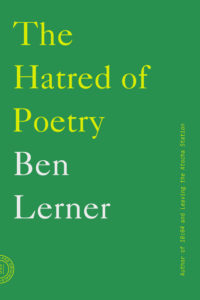 [Farrar, Straus and Giroux; 2016]
[Farrar, Straus and Giroux; 2016]
Poetry is the worst. It makes nothing happen — except debates about poetry, in which people agree that actual poems fall short of the potential of Poetry with the most capital “P.” Poetry that aims for an ideal version of that ideal is even more the worst, since it’s precious and pretentious and primarily interested in its own moonlit ache; its “Esperanto of clichés” fails for being “totally intelligible,” says Adam Gordon, the luxuriously feckless narrator of Ben Lerner’s first novel, Leaving the Atocha Station. The closest we can come to a “profound experience of art,” Gordon believes, is to experience the distance between actual works of art and the claims made for Art, to have “a profound experience of the absence of profundity.”
This view offers facile deconstructionism, a parody of wit. Its cleverness is actually avoidance, as might appeal to an undergraduate who turns in a blank page in place of an essay about Derrida. Or to someone like Gordon, who enjoys a friend’s poems most when he assigns “meaning more or less at random” to each word of Spanish he doesn’t know, who prepares evasive non-sequiturs for a panel discussion. Its solipsism is clear — Gordon notes that by treating language he doesn’t understand as “a repository for whatever meaning” he wishes, he is actually talking to himself — and Lerner plays this boyish self-absorption for laughs. Stendhal syndrome, Lerner suggests, has been replaced by a kind of FOMO that guards against the challenges of authentic experience by questioning, like, the authenticity of authenticity.
Thus, it’s surprising to see Gordon’s belief that poetry “can be understood as referring to [the] failure of language to be equal to the possibilities it figures” reprised in earnest in Lerner’s new book of breezy criticism, The Hatred of Poetry. Here, however, the emphasis is less on the specific possibilities figured by actual poems than on the kind of “pure potentiality” that Gordon romanticizes. Because no poem, Lerner says, can “defeat time” or “shake off the history” of language to achieve the “abstract potential” of Poetry, a poem is “always a record of failure.” One might ask what’s left of life if we shake off history and time, or whether the “abstract potential” of a sandwich is better than any specific grinder, especially if you’re hungry, or whether this is a bombastic way to say that poems exist as poems and not as suggestive clouds of smoke, maybe the kind that, in a dorm room, could make it seem profound that when I am writing this sentence, I am not writing every sentence or the ideal Sentence.
The simplicity of this key premise is disappointing, especially, because Lerner has written perceptively about types of poetry that, for some reason, he barely mentions in this book. In 2006, for instance, he wrote a rhapsodic analysis of the poetry of Rosmarie Waldrop. “I am in a hurry to say that Curves to the Apple is a masterpiece,” Lerner wrote of a new edition of Waldrop’s work, an eagerness that contrasts with the hedging and slinking of Adam Gordon. He praised the book, alongside work by Lyn Hejinian and Michael Palmer, for offering a “heteroglossic lyric” that “captures the complexity of living in language.” I share Lerner’s regard for Waldrop, so I’m surprised that when he mentions her in The Hatred of Poetry, it is only in an anecdote about discovering the work of a laughably shoddy poet, William Topaz McGonagall. Lerner also mentions Elizabeth Alexander, Cyrus Console, and Aaron Kunin — notable contemporary poets, all — but his analysis focuses on conventional readings of the poetry of Keats, Dickinson, Whitman. I understand the value of an opening-week-of-classes consideration of those poets, but Lerner’s argument would be richer if he analyzed the specific types of failure — not just the failure to achieve a transcendent ideal — in, say, Console’s The Odicy, which delights in working words like “Ziploc” and “Diet Rite” into an iambic frame, or in his own poetry. Perhaps, this book is envisioned as an accessible tract by an innovative writer; what a gift it would be, in that case, to see Lerner discuss a poet like Waldrop, rather than gently mock the doggerel of McGonagall.
The Hatred of Poetry isn’t about poets Lerner loves, one might counter, but about refining one’s distaste into a “perfect contempt” to make “a place for the genuine,” as Marianne Moore suggests in her famous poem “Poetry” (“I, too, dislike it”). Who’s overrated? What poetic fashions are unforgivable? Despite the currency of ire in online commentary, let alone in bars after poetry readings, Lerner’s contempt is less for actual poets than for the lapsarian fact of actuality itself, recalling when the narrator of Leaving the Atocha Station suggests that poetry’s purpose is to prevent “the triumph of the actual.” Again, in the novel this is funny, because the “actual” life the narrator fears is one in which he’ll have a job, a family, responsibilities beyond privileged dissipation; lucky fears. One might wonder if the novel’s satirical treatment of these values — of the narrator’s extended adolescence, of the mismatch between his intelligence and his commitments — balances its reproduction of them, any more than a Judd Apatow movie “critiques” masculinity, and one might wonder why a book that advocates disdain is so temperate. The Hatred of Poetry not only avoids specific disses — I mean, has Lerner read the latest book by Frederick Seidel? — but responds with professorial moderation to the claims that Mark Edmundson and George Packer have made against current poetry. Their nostalgia for a time when poetry was Poetry, universal and particular and popular and politicized, is historically inaccurate and aesthetically impractical, Lerner says, rightly.
He seems less temperate, chiefly, when portraying his own disaffection, his desire to protect the possible from the actual. A poetic temperament, he suggests, can’t handle much. An actual film? Better to have the indistinct possibility of “each moment the houselights dimmed.” A difficult poem to know by heart? He’s led to Moore’s poem, he says, because he wished to find the shortest poem for a memorization assignment; given how much The Hatred of Poetry leans on that poem, it’s surprising that Lerner never mentions its more complicated, longer version, nor the complicated history of its revision. The actuality of that complication might trouble the points he uses the poem to make, much as it assaults his poetic disinterest when curious strangers ask him about his favorite poets. He prefers to respond inscrutably and judge his interlocutor’s reaction:
. . . he squints as if searching his memory [for recognition of the contemporary poet Lerner mentioned] and nods as if he can almost recall the work and the name, even though of course he can’t (none of the hundreds of non-poet acquaintances who have asked you this sort of question ever can.)
He’s done this hundreds of times? What nerve those non-poets have, to try to take an interest! If my seatmate is a scientist, and I ask about her field, I’m relieved when she tells me something, rather than judging me as being among the hundreds who are unfamiliar with an obscure name. But Lerner’s rudeness supports poetic possibility. If the stranger resents it, it’s a “contemporary descendant” of Plato’s skepticism about poets’ place in the Republic, not a reaction to one sulky poet. This disaffected posture might seem refreshingly contrarian, as when Lerner suggests that no critic has actually been entranced by the poetry of Keats; but this is a hip and populist stance, less challenging than it would be to assert in 2016, as I am glad to do, that I have wandered through many neighborhoods of Philadelphia reciting Keats in a type of trance that I don’t believe conflicted with the actuality of my surroundings.
But the poet’s lot is hard enough without needing to make conversation, Lerner suggests, since the best a poem can do is point toward an ideal that’s always out of reach. Keats and Dickinson do this when they “express their contempt for merely actual poems by developing techniques for virtualizing their own compositions.” “Virtualizing” refers to methods that help a poem temper the burdensome fact that it’s a poem. Don’t worry about what it means, exactly; Lerner uses the term so variously that it refers to poetic effect in general, to both the long lines of Whitman and to Dickinson’s dissonant syncopations. Thus, the supple sound of Keats’s “and gathering swallows twitter in the skies,” I take it, holds the swallows and its syllables in contempt, not because they aren’t as twittery and swallowy as the Platonic ideal of twittering swallows, nor because they lack the vitality of the live swallows that Jack Spicer might advocate stapling to a page, but because any expression represents “a falling away from the pure potential” of unutterable possibility.
I hear Robert Hass’s “Meditation at Lagunitas” in that last quoted phrase, when Hass speaks of viewing a woodpecker as, “by its presence, / some tragic falling off from a first world / of undivided light.” That poem suggests that the genuine is worth more than the ideal, since experience can make the body “as numinous / as words,” bridging the actual and the virtual, and that bridge is made more by investment and affection than by contempt. Do you really hear contempt — for either the birds or language — in Keats’s description of the swallows? I don’t ask poetry to provide ethics in a music box, but Lerner’s logic, in contrast, seems absurd if we believe, with Frost, that the figure is the same for poetry as it is for love. Should I hold my actual lover in contempt because she, “an actual person in a concrete historical situation,” does not achieve the “abstract potential” of an ideal Lover? Should I vow to “perfect [my] contempt” for her until it “might come to resemble love?” An acolyte of The Hatred of Poetry might say that my ideas about good relationships come from my horrible first three marriages, much as bad poetry, like the work of William Topaz McGonagall, evokes a poetic ideal through its flaws; a poem’s “radical failure” conjures “some ideal, some Poem.”
Foul is fair, in other words. So, if one loves poetry, one should probably read only bad poetry, since good poems show us their failings, while bad poems invoke potential goodness? Setting aside poems that aspire deliberately toward types of irredeemable badness, of kitsch or unassimilable agitation; and setting aside how tired it is to speak of the “great or horrible,” as though all thinking is either positive or negative, as though a book review that doesn’t repeat promotional praise is sour grapes, a slam; and setting aside the varied ideals, varied values, that usually exist in even single poems, let’s think about this logic: if we are making an argument via negativa, the opposite of an actual poem, good or bad, isn’t an ideal poem but no-poem. A bad poem might suggest an impossible and perfect Ur-poem, but it more immediately suggests a contrast with the newspaper, business documents and school books, my fascist dad, the auditorium before the reading started. To romanticize George Oppen’s period of silence, as Lerner does, ignores that his silence is notable because of the poems he wrote in spite of it, not because it let him experience a quiet purity. The negation of Oppen’s work does not point to an absolute, ideal poem nor to an unrealized, ideal Oppen poem but to a world that otherwise would not have his writing. “Mortal, guilty, but to me / The entirely beautiful,” Auden wrote; I prefer the pragmatic romanticism in those lines, and in Oppen (“no narrative but ourselves”), to one of glib disavowal. “Here is the time for the sayable,” says Rilke; there is enough abyss ahead, say what you will. I do not imagine its silence is desirable or cool.
Further, much as my disappointment with Lerner’s essay comes from its specific imprecisions and my respect for his past work, not from a generalized sense that his essay does not achieve the infinite possibility of an ideal essay, his analysis of McGonagall’s verse doesn’t point to an ideal poem but to a better version of McGonagall. We could revise the “clumsy and irregular” meter, we could refine the dull sensibility. And so the history of poetry does not show heroic dreamers approximating an abstract ideal but the kind of dialogic action Lerner praises in Waldrop: Chaucer hears an iambic patter in a four-beat accentual line, Milton hears caesura doing as much work as rhyme. A poem, failed or not, does not imply an unadulterated expanse of possibility but precise possibilities for speech, which come to change how we conceive of possibility itself. Long before the avant-garde called for art that would be a “praxis of life,” Philip Sidney contrasted the “knowing” offered by other disciplines with this embodied “praxis” of poetry. Lerner does not consider this aspect of Sidney’s Defense of Poesy, which he treats surprisingly casually, given its relevance for this book, though he draws on it implicitly when he discusses Claudia Rankine’s Citizen. There, his analysis feels particularly apt: Citizen seems to consistently position itself in relation to what it’s not — it’s not conventionally lineated, it’s not interested in the “universal,” it’s not removed from popular culture, politics, other artworks. In evoking elements that exceed the text, however, I read it as bringing to mind cultural life beyond poetry, not a poetic ideal.
Lerner notes the many things his book doesn’t do, perhaps succeeding by suggesting a potential better book, much as my coffee mug, which fails even more in its commentary, suggests even more; but it still doesn’t do them. One might hope that The Hatred of Poetry is the prematurely published opening chapter of a longer book, a book that might equal Sidney in the disdain it actually expresses (nowhere does Lerner call anyone a “poet-ape”), or that might consider Sidney’s point about how poetic imitation can make philosophy more apparent and history more palpable (as happens in Citizen), or that might revisit Shelley’s related essay and its claims not only against the “excess of the selfish and calculating principle,” which Lerner notes, but its conjecture that poetic language provides a comparable “excess,” which we might connect to the avant-gardist advocacy for the “materiality of language” (“Poetry is form,” Lerner wrote in the Waldrop essay, a Modernist pronouncement of a kind I don’t see in this book). The Hatred of Poetry suggests the positive potential of dislike, but it makes one long for what might happen later in the semester, when the vinegar gets more pungent. The title is provocative, but in response, I don’t feel hatred, only disappointment.
Zach Savich is the author of five collections of poetry, including The Orchard Green and Every Color (Omnidawn, 2016), and a forthcoming memoir about cancer, teaching, and poetic friendship. He teaches in the BFA Program for Creative Writing at the University of the Arts, in Philadelphia, and co-edits Rescue Press’s Open Prose Series.
This post may contain affiliate links.







